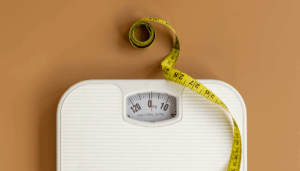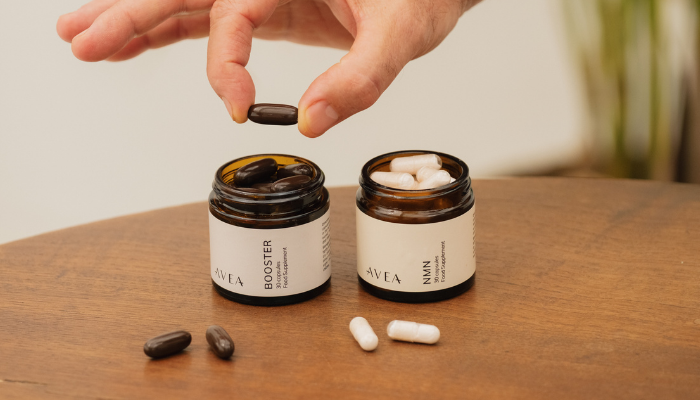Are you settling for the average European life expectancy, or are you striving to defy the odds? The continent may be rich in history, but when it comes to longevity, there are some crystal clear disparities and inequalities.
From the wine-sipping centenarians of southern France to the urban dwellers of Eastern Europe, your postcode might just be predicting your health outcomes. But what if we told you that you have the power to transcend not only your location but also your genetic predispositions?
This is not about mere survival; it’s about thriving. Discover how you can turn the tables on the average life expectancy in Europe. How about some tips to enhance your life quality, and maybe even tilt the scales of longevity in your favour—right here, right now?
In this article
Free guide to reverse your biological age

- Master the science of rejuvenation.
- Apply proven tips to turn back the clock.
- Transform your health with top longevity specialists.
Life expectancy in European countries
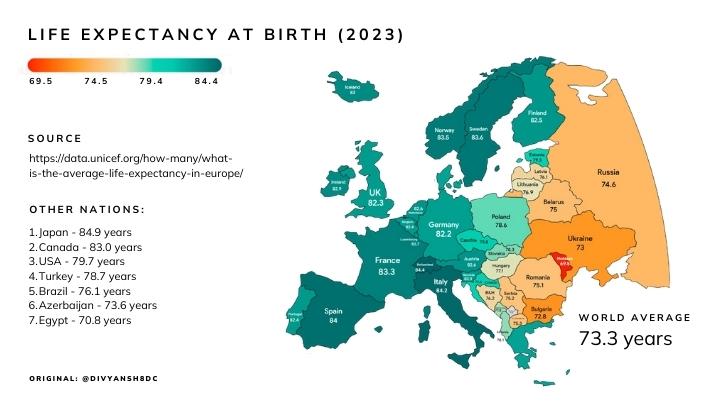
Europe offers a striking contrast in how long its citizens live, from an average of 84 years in Spain to about 72.8 years in Bulgaria. These numbers are shaped by multiple factors including healthcare access, lifestyle, and social determinants.
Take France, for example, struggling with the challenge of an ageing population, policymakers have recently increased the retirement age. But what’s behind these numbers? Is it the superb healthcare system of one nation, or the socioeconomic hurdles of another? One might say so.
France serves as a poignant case study. In a bid to cope with its ageing populace, the French government has controversially upped the retirement age. Yet, increasing the retirement age is but a band-aid solution. Some will say, it’s not even one, and we totally agree.
Could there be another way to handle the challenges and complexities that come with a population living longer? What if the answer lay not in stretching the limits of a strained system, but in fortifying the health of individuals through smart choices and cutting-edge technology and research?
What if the society was rebuilt for what is yet to come? The world is ageing and we need changes at political level, changes that takes into consideration some science-backed data in how to keep us adults, healthy and functioning for longer.
It’s high time we delve deeper into how you can be more than just a statistic in Europe’s longevity landscape.
The foundation for a longer life expectancy
If you want live longer than the European average, there are some lifestyle changes that are a must. Take lessons from the Blue Zones; regions of the world with the longest lived. People in the Blue Zones don’t just live longer, they live well in their old age without any chronic disease. Read more about Blue Zones here.
Here are some science-backed ways to increase your healthspan and potentially your lifespan.
Nutrition for longevity
In Europe, there are diet patterns that celebrate indulgence rather than balance. From the sausage-laden plates of Germany to the buttery croissants of France, these foods might satisfy your palate, but can create internal havoc over time.
While these diets have their cultural and even nutritional merits, they often fall short in providing a complete, balanced profile of nutrients crucial for long-term health. This becomes increasingly concerning when you consider the statistics.
Across Europe, rates of obesity, heart disease, and type-2 diabetes are escalating, pointing to a grim reality: our traditional diets may be failing us. It’s time to look towards a dietary model that has stood the test of time and rigorous scientific scrutiny—the Mediterranean diet [1].
The Mediterranean diet is high in vegetables, fruits, legumes, nuts, fish, and olive oil. Not only is it delicious, but it’s also highly nutritious. The diet is rich in antioxidants, fibre, and healthy fats, all essential players in the longevity game.
The beauty of the Mediterranean diet is not just what it includes, but also what it minimises: refined sugars, processed foods, and excessive red meat. Multiple studies have demonstrated the Mediterranean diet’s efficacy in reducing the risk of chronic diseases, particularly heart disease, and promoting overall longevity.
In essence, this dietary pattern encapsulates the vital principle of eating not just for the ‘here and now’ but for the ‘future you.’ Switching to a Mediterranean-style diet could offer you a lifeline in navigating the tricky waters of nutrition and ageing.
Imagine a lifestyle where your plate not only tantalises your taste buds but also nourishes your cells, enriches your gut, and calms your inflammation. Adapt the Mediterranean diet to your life, and you might find that the best years are still ahead of you.
Exercise for longevity:
One element that often surpasses the benefits of other longevity boosters is exercise [2]. As we age, our physical capabilities may diminish, but that doesn’t mean we should abandon exercise; it means we must adapt our routines to fit our changing bodies.
For the wise among us, a well-tailored exercise regimen can be the gateway to not just a longer life, but a more enjoyable and fulfilling one as well. While high-impact sports and rigorous gym sessions may not be everyone’s cup of tea, particularly for older adults, there are countless other ways to keep the body in motion.
Low-impact exercises like walking, swimming, and gardening provide a gentle yet effective approach to physical fitness. These activities are not just beneficial for cardiovascular health; they are also excellent for mental well-being, joint flexibility, and muscle tone.
The golden rule? Aim for at least 150 minutes of moderate exercise per week. That roughly translates to about 20 minutes a day, a time investment that can yield exponential returns for your heart, muscles, and overall vitality.
But the best part? You don’t need to do it all at once. Break it down into shorter, more manageable sessions if you must. Consistency trumps intensity when it comes to longevity.
And let’s not overlook the additional benefits: exercise is a fantastic opportunity for social engagement. Whether it’s a morning walk with friends or an aqua aerobics class, exercising in a group can provide that much-needed dose of social interaction, contributing to mental health and, by extension, life expectancy.
Stress management for longevity
Stress—often called the ‘silent killer’—holds more sway over our lives than we may care to admit. From triggering inflammation to accelerating cellular ageing, unmanaged stress can substantially shorten the road to longevity [3].
But before you stress over your stress, let’s explore some effective strategies to keep it at bay, particularly as we gracefully navigate the ageing process.
Mindfulness and meditation have been stealing the limelight recently—and rightfully so. Numerous studies highlight the efficacy of mindfulness in lowering cortisol levels, the body’s primary stress hormone. Just dedicating a mere 10 minutes a day to mindful breathing can equip you with a potent tool to combat everyday stressors. If sitting still isn’t your forte, fret not; mindfulness can be practised even while walking or doing chores.
Beyond mindfulness, physical exercise is another excellent stress-buster. As we discussed in the previous section, a moderate, consistent exercise routine can do wonders for both your physical and mental health. When you exercise, your body releases endorphins, the ‘feel-good hormones,’ which act as natural stress relievers.
Diet, too, can influence your stress levels. Foods rich in antioxidants, omega-3 fatty acids, and B vitamins can help mitigate the physiological responses to stress. If you’re already vigilant about your diet and exercise, consider supplementing these with adaptogens like ashwagandha, which are known for their stress-reducing properties.
Additionally, never underestimate the power of a robust social support system. Engaging in meaningful conversations, participating in community activities, or even just spending quality time with loved ones can serve as potent stress buffers. Isolation, on the other hand, can exacerbate stress, so make it a point to cultivate and maintain strong social bonds.
Practical tips
Start being mindful
- Track everything you eat and drink.
- Review periodically to identify patterns or gaps.
- Increase mindfulness about food choices.
- Be aware how you eat– eat slowly and don’t get full.
Incorporate foods that your body loves
- Make fruits, vegetables, nuts, and legumes a meal staple.
- Keep meat for special occasions and avoid highly processed foods as well as sugar
- Eat your veggies followed by proteins, then carbs. Order matters.
Sweat it out
- Aim for at least 150 minutes of moderate exercise per week.
- Balance cardio activities like brisk walking or Zumba.
- Cardio for heart health, strength training for muscle and bone density.
Take time for yourself
- Start self-care like journaling or setting small goals for yourself.
- Learn to say no, prioritise your needs and take action.
- Maintain healthy relationships with friends and family, and set boundaries where needed.
The extra mile: the role of supplements in longevity
Supplementation can be a valuable addition to your longevity toolkit. Research has demonstrated that certain supplements can boost general wellness, immune health, and even cognitive function.

Over 90% of the population is deficient in critical nutrients like Vitamin D, Magnesium, and Omega-3.
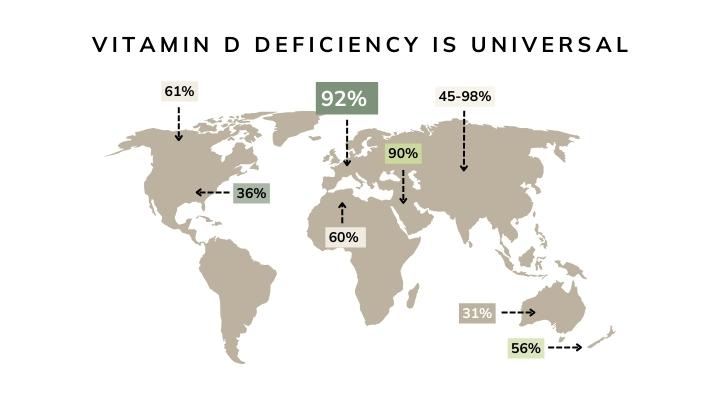
This is where the Essentials from Avea come into play– offering a targeted and scientifically-backed approach to wellness. It isn’t designed to replace a balanced diet; it’s intended to augment it.
We recognise that even with the best dietary intentions, achieving optimal levels of crucial nutrients daily can be a difficult task. Whether it’s the high-paced lifestyle, the soil that’s sadly losing its nutritional integrity year by year, or continued stress– smart supplementation is really your friend when it comes to a healthier you. Plus, you’d automatically start doing more healthy stuff for yourself.
Key nutrients in the Avea Essentials
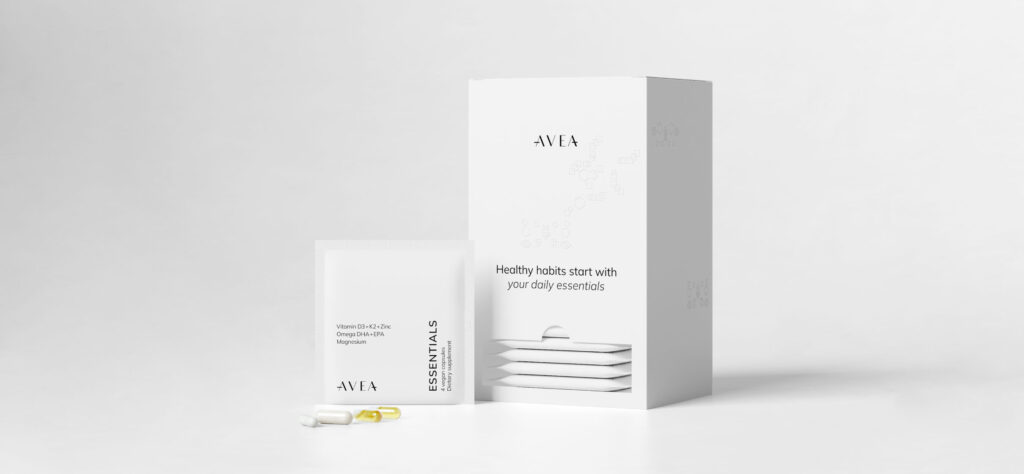
- Omega-3 fatty acids: Boosts cardiovascular health.
- Vitamin D3 & K2: Important for bone health and immune function.
- Magnesium: Supports over 300 metabolic reactions, including muscle and nerve function.
- Zinc: Supports immune function, wound healing, and other biological processes.
We’ve crafted ‘The Essentials’ to make sure you don’t miss out on these key nutrients, not as a substitute for whole foods, but as a reliable safety net. It’s your daily assurance that you’re getting the requisite amount of these vital elements, thereby laying the groundwork for a healthier, longer life
Key takeaway
The answers lie in a potent mix of lifestyle choices, modern science, and, believe it or not, smart supplementation might be an essential boost. So, why settle for average when you could be extraordinary? Take the first step together in crafting a longer, healthier life for you today.
Remember, you have the chance to transcend these geographical odds from your continent. We’re not just talking about adding years to your life, but life to your years, using a combination of balanced nutrition, exercise, and of course, the right supplements.
References





